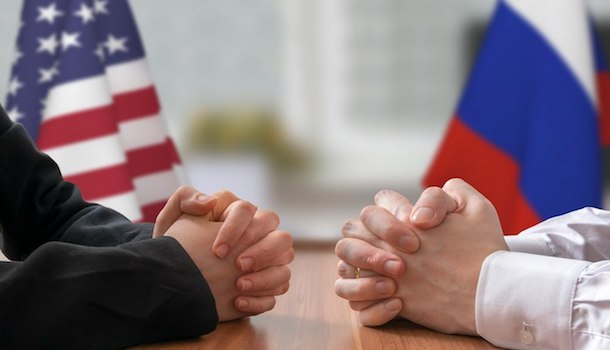Format: situational analysis session under the Chatham House Rule
Organisers: Minsk Dialogue Track-II Initiative in cooperation with the Wilfred Martens Centre for European Studies (Belgium) and Konrad Adenauer Foundation (Germany)
Working languages: English and Russian
The recent crisis in Russian-UK relations clearly demonstrates that the conflict between Russia and the West continues to worsen. Today’s trends increasingly resemble the state of international relations and security during the Cold War era. The erosion of international security regimes may lead to a new arms race, which makes the risk of armed incidents more and more likely. This, in turn, can trigger a new big war.
If the proposition that we are observing a new “cold war” in the making is correct, then researchers, diplomats and politicians should turn their attention to the legacy of the past Cold War. The history of the confrontation and interaction between the two conflicting blocs in the late 1940s – early 1990s contains many practical lessons. Hypothetically, these lessons can suggest to present-day leaders what steps are worth taking to establish communication channels and make relations, at least, predictable and stable. They can also point to steps that should not be undertaken under any circumstances, so as not to provoke an armed conflict. In addition, the lessons of the Cold War can help small states in developing strategies for their own survival and development in the face of growing geopolitical confrontation and multiple factors of unpredictability.
Yet, it is also obvious that in many respects the situation today differs significantly from the realities of the Cold War and the confrontation between the USSR and the United States. Therefore, it is fair to pose a question: how relevant are the historical parallels for the development of the system of international relations and security in general, as well as for the region of Eastern Europe, which once again has become the epicentre of geopolitical tensions?
Questions for the discussion:
- Structural characteristics, similarities and differences between the Cold War of the 1940s-1980s and today’s conflict between Russia and the West?
- The main conflict zones and the level of their explosion hazard (comparative analysis).
- Assessment of international agreements and security regimes. Why does the existing international security architecture fail to deliver? Lacunae in international security regimes and potential risks.
- A new balance of power and strategic deterrence: is there a threat of an arms race?
- What are the main interests of key players and can there be points of mutual interest? What are possible scenarios for the Cold War 2.0?
- Lessons of the Cold War: what mechanisms can we use today to de-escalate tensions and build a stable and predictable international system?
- Strategies and tactics of in-between countries, and “situational neutrality” then and now (with a focus on Central and East European states in the former Socialist block).
Programme
|
10.00 |
Welcome coffee |
|
10.00 – 10.15 |
Welcoming remarks
Yauheni Preiherman, Minsk Dialogue Track-II Initiative (Belarus) Wolfgang Sender, Konrad Adenauer Foundation (Germany) |
|
10.15 – 10.30 |
Introductory remarks on the theme and methodology
Yauheni Preiherman, Minsk Dialogue Track-II Initiative (Belarus) Dzianis Melyantsou, Minsk Dialogue Track-II Initiative (Belarus) |
|
10.30 – 11.00 |
Cold War: definitions, rules, vulnerabilities, incidents, and the logic of confrontation
Roza Turarbekova, Belarusian State University (Belarus) |
|
11.00 – 12.00 |
Relations between the USA and USSR during the Cold War: the formation of stable rules, channels of communication, mechanisms for reaching agreements, and the logics of containment and détente
Vladimir Socor, Jamestown Foundation (USA) Sergei Utkin, Primakov National Research Institute of World Economy and International Relations (IMEMO), Russian Academy of Sciences; Centre for Strategic Research (Russia) |
|
12.00 – 13.00 |
Cold Wars 1.0 and 2.0 compared: main commonalities and differences and their implications for the practice of present-day international relations
Vladimir Senko, Minister of Foreign Affairs of Belarus (1994-1997) Aliaksandr Baichorau, Belarusian State University (Belarus) Anton Boltochko, Discussion and Analytical Society Liberal Club (Belarus) |
|
13.00 – 14.00 |
Lunch |
|
14.00 – 15.00 |
The strategies of European members of the “socialist block” during the Cold War: satellites and neutrals
Andras Racz, Centre for Strategic and Defence Studies (Hungary) Siarhei Bohdan, Free University of Berlin (Germany) |
|
15.00 |
Afternoon coffee |
|
15.00 – 16.00 |
Helsinki Process: from the idea to the Helsinki Final Act. Lessons learned for the contemporary world.
Yauheni Preiherman, Minsk Dialogue Track-II Initiative (Belarus) Dzianis Melyantsou, Minsk Dialogue Track-II Initiative (Belarus) |
|
16.00 – 17.50 |
Scenario-building exercise, probability assessment, and factor-level analysis. Drafting of policy recommendations based on the results of the scenario-building exercise. |
|
17.50 – 18.00 |
Concluding remarks. |


